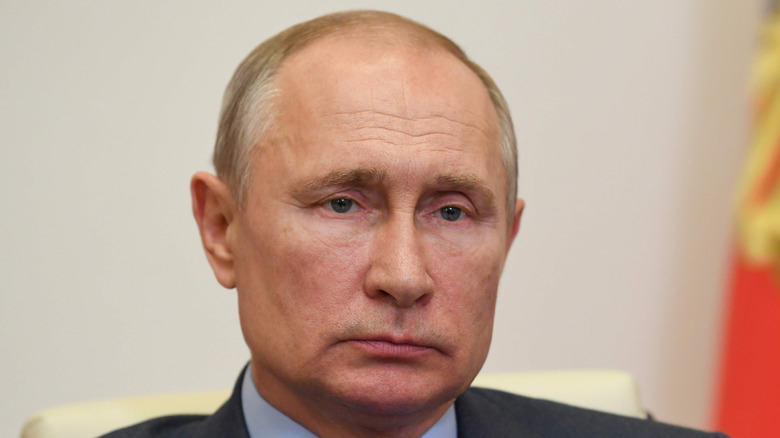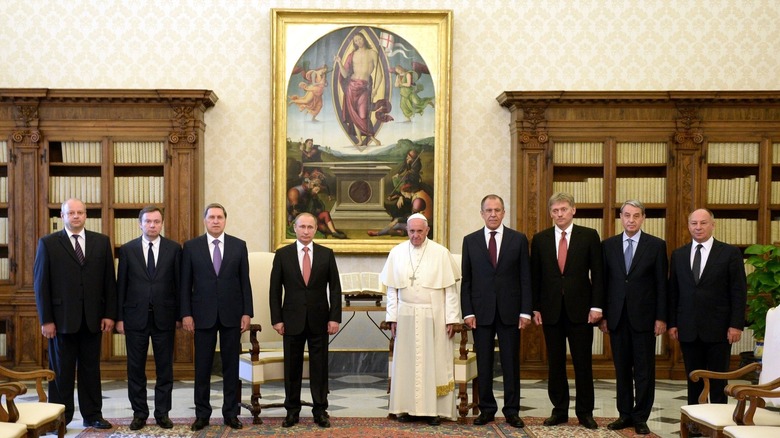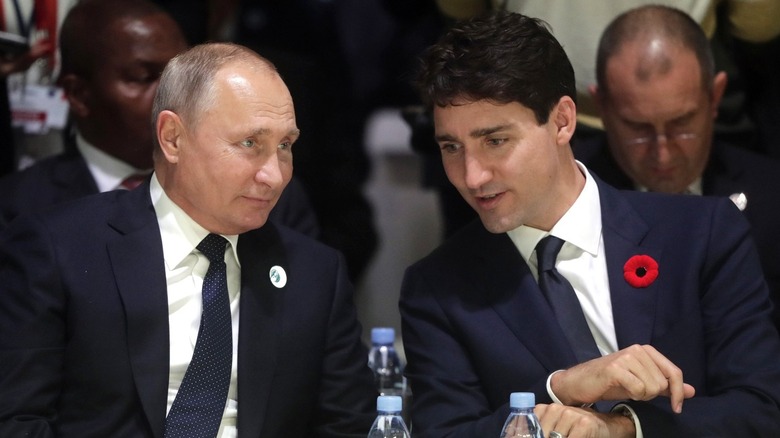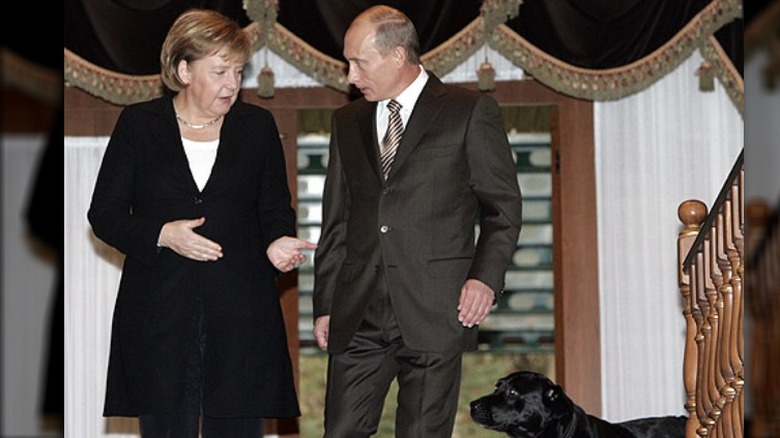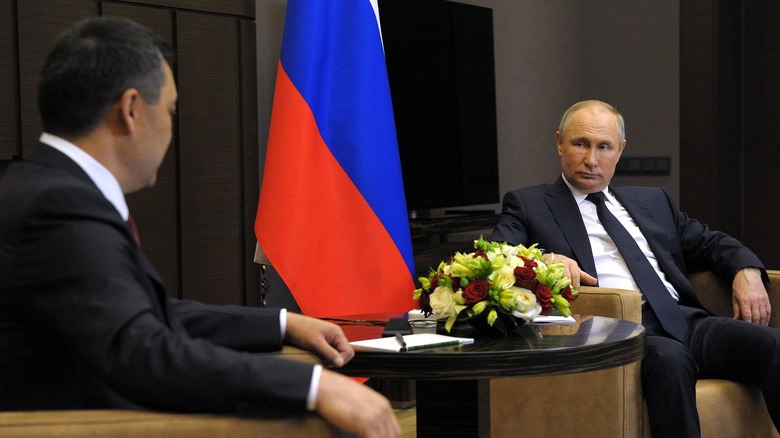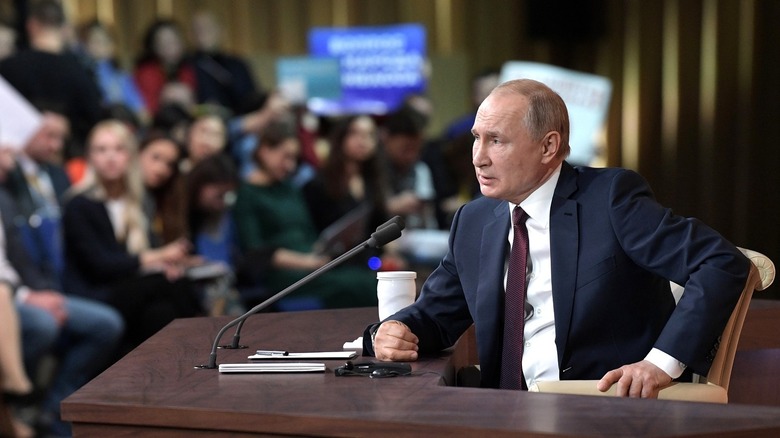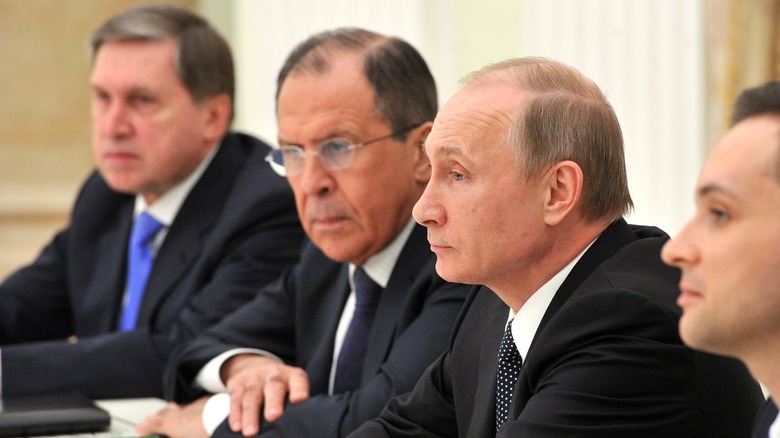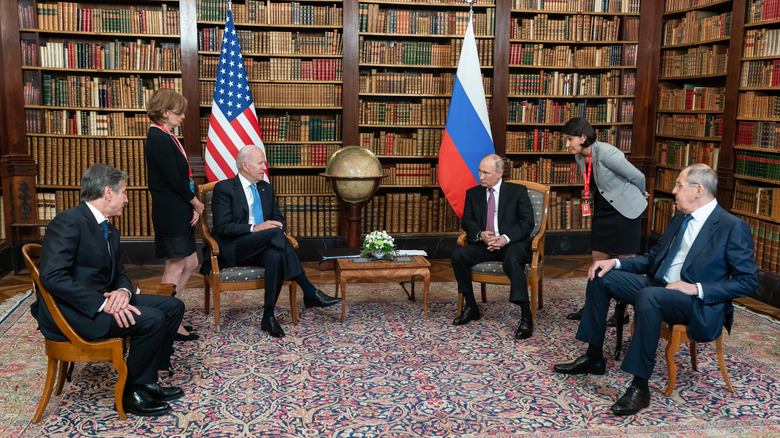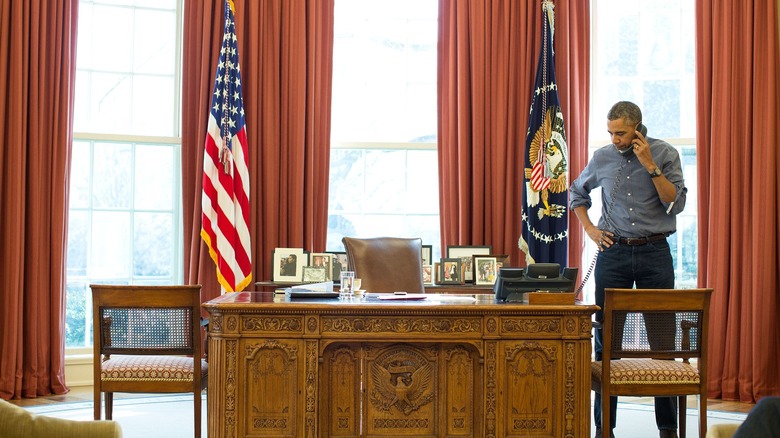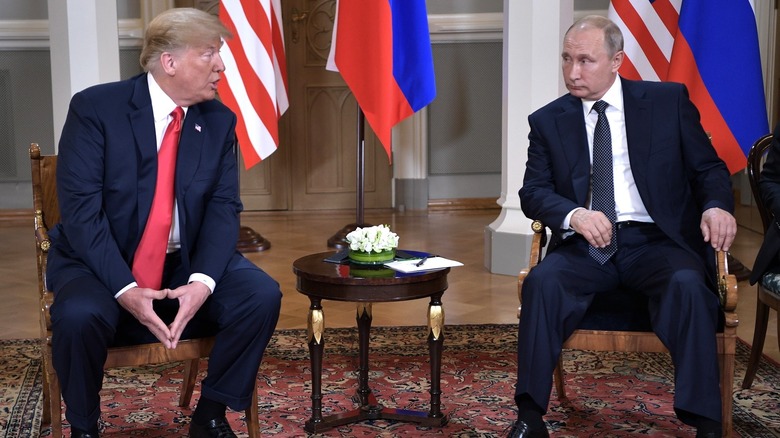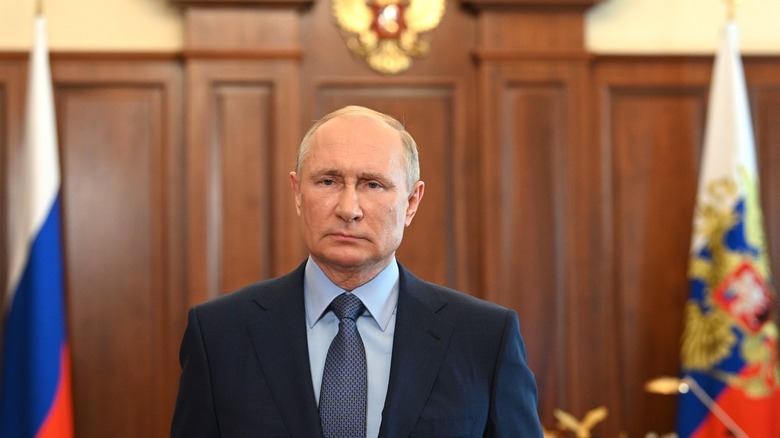The Biggest Mistakes People Make When Meeting Vladimir Putin
For those of us who aren't foreign diplomats or high-powered world leaders, the idea of working as one may seem pretty daunting. There's the intense public scrutiny, the pressures of elections, uncomfortable-looking business wear, and endless meetings. Some of those meetings may have the political and moral weight of deciding what to serve at the next luncheon, but, for the most intense and frustrating occasions, you could very well be meeting with President Vladimir Putin.
Though he's not exactly unique when it comes to world leaders throughout history, Putin is one of the more intense meeting partners for modern heads of state. He's proven to be a tough opponent for the United States of America in particular, often happy to cite a long list of grievances between the U.S. and Russia while skirting similar issues in his own nation (via CNBC). And he's not above what some may deem petty or underhanded tactics, from making his summit partners wait for hours, to even "accidentally" allowing his dog to interact with a famously dog-phobic chancellor.
But, it's in no one's best interest to ignore Russia, which has long been a serious player on the world stage with nuclear capabilities and a wide geopolitical reach, according to the Brookings Institution. So, leaders continue to meet with Putin. And, as history has shown, they've made some key mistakes that will hopefully serve to inform later, more successful meetings with the Russian president. Here are the biggest mistakes people make when meeting Vladimir Putin.
Expecting Putin to arrive on time
One of the most common tactics deployed by President Vladimir Putin is simply to show up late. While this may make people like your punctual dad grind their teeth in frustration, it's pretty clearly a power tactic that's been employed by Putin again and again in order to make his counterpart sweat. According to Business Insider, Putin kept President Donald Trump waiting for almost an hour before a 2018 summit in Helsinki, Finland. That wasn't so bad compared to the hours that he makes officials from Ukraine wait, or the one time he made the Chancellor of Germany Angela Merkel wait for a whopping four hours. Even Pope Francis had to wait an hour to meet with Putin (via the Times).
It was likely cold comfort to Trump, who may have known that others were taken more seriously by Putin. Queen Elizabeth II of England, for instance, only had to wait 14 minutes for Putin to roll into their meeting, per Business Insider.
President Joe Biden's June 2021 summit with Putin was a little different, however. Stanford professor and foreign policy expert Michael McFaul tweeted that he had seen the summit schedule ahead of time, noting a key detail: Putin would arrive first. "If Putin is late tomorrow," McFaul wrote, "Biden won't be standing around awkwardly waiting." It's not exactly a big political win but, when it comes to establishing a relationship with the famously stance-conscious Putin, it's still a significant move.
Expecting deliverables from a single meeting with Putin
Meetings with other leaders may lead directly to signed agreements and policy changes, but that's not always the case. And, when it comes to summits and face-to-face encounters with Putin, few analysts expect direct results every single time. Rather, leaders who meet with him should expect to play a long game.
And what is that long game, exactly? It's not just about posturing — though it arguably is when it comes to President Vladimir Putin and many other leaders — but it's also about communication. Ambassador John J. Sullivan, who was appointed Ambassador to the Russian Federation by President Trump in 2019 (via U.S. Embassy & Consulates in Russia), and who continued in that role for the Biden administration, certainly says as such. "We don't think of U.S.-Russia summits in terms of deliverables," he said via CNN. "We are thinking of it as an opportunity to communicate what our intentions and capabilities are."
Perhaps it is more useful for us to think of a summit such as the June 2021 one between President Joe Biden and Putin as the beginning or continuation of a conversation that will, hopefully, yield good results later on. And, as the New York Times reports, there's plenty of tension and a lot of work to do, though both Biden and Putin claimed that their meeting was "constructive" and, in Putin's words, contained "glimmers" of trust between their two nations.
Letting him know you're afraid of dogs
It seems that President Vladimir Putin and his team aren't above using intimidation tactics that draw on an individual's everyday fears. Never mind that someone is an important political leader who's there to discuss important issues and possibly even get something done about the matter. How can they be intimidated and overpowered at the meeting? And what are their opinions on dogs?
Strange as this may seem, dogs became a bit of an issue during a 2007 meeting between Chancellor Angela Merkel and Putin. According to the New Yorker, the incident in question happened when the two were discussing energy issues in Putin's home in Sochi, Russia. His black lab, Koni, entered the room and sniffed Merkel. Putin surely knew that Merkel, who had been bitten by a dog in 1995, was afraid of the animal. Yet, he reportedly sat back and casually said, "I'm sure it will behave itself" as Merkel continued the meeting in a rather more tense mood.
Later, as the German press came to Merkel's defense, she told reporters "I understand why he has to do this — to prove he's a man... Russia has nothing, no successful politics or economy. All they have is this." Yet, in that moment of power play, Putin may well have assumed that he won on this small front, regardless of Germany's later complaints — and all because of his large and intimidating pet dog.
Getting distracted by Putin's insults and complaints
One might get the sense that President Vladimir Putin is something of a bully on a geopolitical scale, at least if you're on the receiving end of one of his grievances. Those barbs, according to John Finer, chief of staff to U.S. Secretary of State John Kerry, could often take the form of a list of complaints. As Finer told NPR, "[The Russians] have a way of trying to start these meetings with a long litany of grievances, going back sometimes decades."
That may be annoying to some diplomats, to be sure, but it can also be a crippling distraction technique. After all, if a representative is there to talk about Russia's incursion into Ukraine or its role in a civil war, then what good is it to talk about the Cold War? Trying to fight back against these accusations, whether or not Putin has a point, is only going to waste time and put non-Russian negotiators on an uncomfortable defensive.
Instead, Finer argued, it's better to let Putin and his team air their grievances, make a show of taking in their comments, and then pivot to the matters at hand. Of course, people like Secretary Kerry or President Biden should do so with the understanding that Putin can genuinely believe in those issues. "The Russians have a coherent worldview," said Finer. "And so to go in thinking that they are irrational in these views I think is not a constructive way forward."
Allowing Putin to have the first word after the meeting
After a summit with President Vladimir Putin comes the press conference. In many ways, this is an important move, not only because it lets the rest of the world know what happened, but because it also gives the respective world leaders a chance to position themselves and frame the narrative. For many heads of state, giving Putin too much leeway to establish that narrative has backfired.
Take the post-summit presser after former President Donald Trump's Helsinki meeting with Putin in July 2018. Per CNN, Trump appeared to side rather heartily with Putin, denying Russian involvement in the 2016 U.S elections and going against the findings of the U.S. intelligence community. As former U.S. ambassador to Russia and Stanford professor Michael McFaul told NPR in 2021, "Helsinki will go down in history as the worst bilateral meeting between Russians and Americans ever." That's not only because Trump appeared alarmingly dismissive of his own intelligence reports, but because he allowed Putin to get in ahead of him on the narrative.
President Joe Biden's June 2021 meeting with Putin seemed to draw lessons from this mistake, at least in part. There was no joint conference between the two leaders, but analysts fretted over the fact that Putin would speak independently first, while Biden waited to speak until after consulting with his own government officials. It's also worth noting that, unlike other leaders, Putin pretty much has free reign to go straight to a press conference, as Axios notes.
Forgetting to bring along other officials to the meeting
A private summit might be preferred for certain situations, but it also opens leaders up to a situation in which "truth" is determined more by who has the most compelling narrative, not the best witnesses or, you know, actual documentation. And, while some leaders may believe that those private conversations allow them to speak with President Vladimir Putin frankly and without the intensity of other government officials observing and taking notes, that strategy can backfire even in the seeming safety of home territory.
Take the private conversations between former President Donald Trump and Putin that took place during the former's time in the White House. According to the Washington Post, the two spoke privately at least 16 times between January 2017 and October 2019, a record that includes confidential phone calls. Given the allegations of Russian interference with the 2016 U.S. elections, the fact that these conversations were kept hush-hush did little to uphold Trump's reputation. Furthermore, there were no witnesses to bolster the claim that the president was behaving appropriately and not engaging in shady backroom political deals.
In face-to-face interactions, bringing backup may not only mean bringing a witness, but a key supporter. Putin certainly does, often in the form of advisors like foreign minister Sergey Lavrov. Axios notes that Lavrov is an "inscrutable character" who can disarm and intimidate in equal measure, while press secretary Maria Zakharova can often be seen snapping pictures and shortly thereafter posting them online.
Going straight to meet Putin before other leaders
In his June 2021 summit with President Vladimir Putin, President Joe Biden put the meeting deliberately later in his touring schedule, well after other meetups with European leaders. He reportedly did so to have the "wind at his back" and so to show increased political support for U.S. interests throughout the region, according to CNN.
That can be a pretty significant step, even though it may seem like a small thing to outside observers. Putin is no fool, after all, and he would surely notice if other leaders in Europe or elsewhere were rallying around Biden or another summit meeting counterpart. Now, this is not exactly a bombastic tactic, nor is it an intimidating one, but it can often be used to send a significant message. It's certainly been done before.
For instance, CNN reports that the United States had already used this exact strategy ahead of a meeting with Chinese leaders earlier in 2021. Secretary of State Anthony Blinken didn't go straight to Chinese Premier Xi Jinping or other Chinese officials as he traveled from the United States. Instead, he spent a little time traveling through the region, meeting up with national leaders who were more overtly friendly to the United States. He therefore showed that diplomatic support for the Biden administration was relatively strong ahead of the big meeting with China. After all, it must be much easier to negotiate with a crowd of supporters rallying behind you than to stand alone.
Passing on the in-person meeting with Putin
President Joe Biden has said that he believes President Vladimir Putin responds most to "signs of strength" that are best communicated in person, per a report from CNN. It seems a telephone call simply won't cut it in the political tete-a-tete between two leaders, especially where the Russian president is concerned. This is no time to be shy or coy, particularly when the leaders are discussing heavy topics that include cyberterrorism, civil wars, and tension-filled economic agreements.
And, while some leaders tend to take a more gentle, moderated approach to meeting with Putin (perhaps in the hopes that they will win his approval in that manner), Biden takes a far different tack. He's even reportedly told Putin to his face during a 2011 meeting (when Biden was vice president) that "I don't think you have a soul" (via CNN).
While some presidents or premiers might take exception to that, it seems that Putin was unruffled by the blunt remark — perhaps because of the way in which it was delivered in person. According to Biden, Putin appeared to be satisfied by the remark and even told Biden at that meeting that "We understand each other" (via CNN). Yet, when Biden later told a reporter he believed Putin was a "killer," the statement caused serious upset in Russia, leading to the recall of the U.S. ambassador there. It could be that the lack of a direct meeting contributed to the controversy.
Backing down on key issues because you're intimidated or distracted
Meeting with a strong willed, intelligent, and canny premiere like President Vladimir Putin is tricky, to say the least. You need to balance the niceties of social interaction and diplomacy — shaking hands, for instance, or sitting down calmly at a table and pretending to be two reasonable adults when you speak politics — with a certain measure of straightforward communication. Where other heads of state may appreciate politeness and small talk, it seems that Putin is often more receptive to a certain level of bluntness. CNN reports that, over the course of his diplomatic career, President Joe Biden has repeatedly stated his less-than-glowing estimation of Putin to the Russian leader's face, with surprisingly even-tempered reactions from the Russian president himself.
And with that sort of bluntness you must also bring a serious tenacity. Biden, it seems, has learned that you can't back down in front of Putin, lest you both lose face and lose progress. As NPR notes, that basically means you need to have a game plan and stick to it, dodging distraction and intimidation techniques to get some semblance of progress moving. That also means not shying away from difficult topics. Former U.S. ambassador to Russia and Stanford professor Michael McFaul told NPR that, upon seeing the March 2011 meeting between then-Vice President Biden and Putin, "I was impressed by how the vice president would not let go of the difficult issues."
Thinking it's all over when the meeting is done
Diplomacy is not a one-and-done sort of game. And it certainly isn't so when meeting with leaders who like to play the long name, especially if their name happens to be President Vladimir Putin. Meeting with Putin often appears to be either an opportunity for a new leader to set the tone for their interactions with the Russian president, or for an established head of state or diplomat to continue their ongoing efforts to get something out of the political relationship between their country and Russia.
And so, while CNN reports that few, if any, leaders expect "deliverables" from a single meeting, neither should they think that things end when they walk out of the room. Axios notes that dealing with Putin can prove pretty challenging for anyone, especially when it comes to resolving conflicts and speaking about the meeting itself.
Furthermore, it's not as if some of the big issues that other leaders have pinpointed with Russia's activities have ended after a single meeting. After all, as Michael McFaul told NPR, "Putin has never admitted to a mistake ever in 20 years of running that country." And so, Russian incursions into foreign territory, like their invasion of nearby Georgia and parts of Ukraine, persist. Coming to some understanding and action on these sorts of issues with the iron-willed and sometimes seemingly immovable Putin will almost certainly never happen over the course of a single summit or presidential administration.
